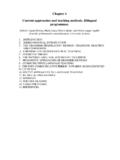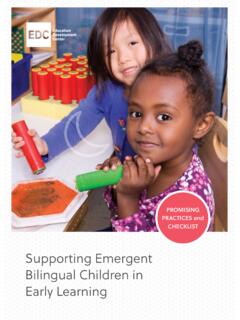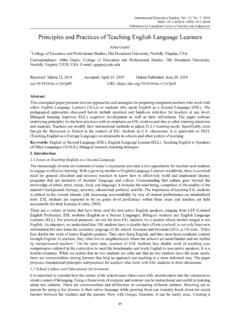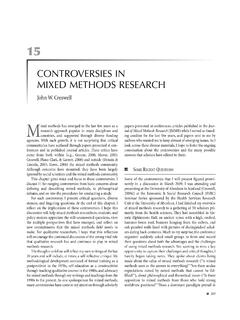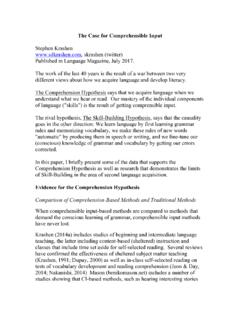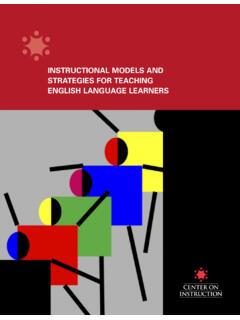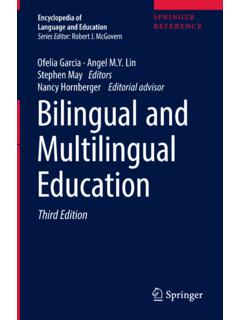Transcription of INSPIRED ISSUE BRIEF: INQUIRY-BASED TEACHING
1 INSPIRED ISSUE BRIEF: INQUIRY-BASED TEACHING . I. nquiry- based TEACHING is a pedagogical approach that invites students to explore academic content by posing, investigating, and answering questions. Also known as problem- based TEACHING or simply as inquiry ,' this approach puts students'. questions at the center of the curriculum, and places just as much value on the component skills of research as it does on knowledge and understanding of content. Research on INQUIRY-BASED TEACHING has often focused on its application in science and math education, but the approach is equally well-suited to the TEACHING of the humanities. Likewise, some believe that an INQUIRY-BASED approach can't be implemented until late in a student's school career, but the process of TEACHING and learning through personal investigation is appropriate for students from preschool through graduate school.
2 The role of the teacher in an INQUIRY-BASED classroom is quite different from that of a teacher in a conventional classroom. Instead of providing direct instruction to students, teachers help students generate their own content-related questions and guide the investigation that follows. Because of the role of the teacher in an INQUIRY-BASED classroom is unconventional, it is sometimes misunderstood. Administrators, parents, or even students may not recognize the hard work that goes into planning and implementing an INQUIRY-BASED approach in fact, it may seem that teachers aren't doing anything as students struggle to formulate questions and seek out answers.
3 Nothing could be further from the truth. When teachers choose to use an INQUIRY-BASED approach, they commit to provide rich experiences that provoke students' thinking and curiosity; to plan carefully-constructed questioning sequences; to manage multiple student investigations at the same time; to continuously assess the progress of each student as they work toward their solution or final product; and to respond in-the- moment to students' emerging queries and discoveries. There are strong arguments for choosing an INQUIRY-BASED approach over more conventional models of direct instruction. An INQUIRY-BASED curriculum develops and validates habits of mind' that characterize a life-long learner: It teaches students to pose difficult questions and fosters the desire and skills to acquire knowledge about the world.
4 Students are given opportunities to take ownership of their own learning, a skill necessary for one to succeed in college and in most professional settings. Additionally, an INQUIRY-BASED approach allows students to draw connections between academic content and their own lives, which can be particularly important for culturally and linguistically diverse learners. This INSPIRED ISSUE Brief presents several sound studies that have demonstrated the positive outcomes associated with INQUIRY-BASED TEACHING . 2008, Center for INSPIRED TEACHING . 1436 U St NW, Suite 400 Washington, DC 20009 INQUIRY-BASED TEACHING inspires students to learn more, and to learn more thoroughly.
5 Middle-school physics students taught through inquiry outperformed high school students taught with conventional methods . Three middle school science teachers in urban public schools taught fundamental concepts of physics by using a computer- based inquiry curriculum. Instead of emphasizing facts and details, the curriculum engaged students in authentic scientific investigations that asked students to create and apply models of force and motion. The curriculum also challenged students to inquire into their own learning, through an exercise that invited students to generate and discuss a personal assessment of their performance in class.
6 Students who benefited from this type of TEACHING outperformed high school physics students when asked to apply the concepts of force and motion to real-world situations. The study also found that lower-performing students who engaged in self-assessment earned scores closer to those of the high-achieving students. White, Barbara, Todd A. Shimoda, and John R. Frederiksen. 1999. Enabling Students to Construct Theories of Collaborative inquiry and Reflective Learning: Computer Support for Metacognitive Development. International Journal of Artificial Intelligence in Education 10: 151-182. An INQUIRY-BASED curriculum yielded significant gains in student achievement without sacrificing state curriculum standards.
7 In a partnership with Detroit Public Schools, researchers at the University of Michigan implemented INQUIRY-BASED science units in sixth, seventh and eighth grade classrooms over a three- year period. One unit, for example, was based on the question, How can I move big things? and invited students to create projects to explore simple machines and the concept of force. Over 8,000 students were tested before and after the curriculum was implemented and to assess their knowledge of the content, understanding of the process, and overall achievement. Each of these three categories was evaluated for students enrolled in the six courses offered using this curriculum, resulting in eighteen assessment categories.
8 In seventeen of eighteen categories, students who took part in the inquiry curriculum made statistically significant gains in achievement. The researchers concluded that their results demonstrate that an inquiry approach can benefit students who have been low achievers in the past. Marx, Ronald W., Phyllis C. Blumenfeld, Joseph S. Krajcik, Barry Fishman, Elliot Soloway, Robert Geier, and Revital Tali Tal. 2004. INQUIRY-BASED Science in the Middle Grades: Assessment of Learning in Urban Systemic Reform. Journal of Research in Science TEACHING 41 (10):1063-1080. In English classrooms where teachers asked authentic questions designed to explore understanding instead of test' questions that checked what students already knew, students learned more.
9 A researcher at University of Wisconsin observed the patterning of questions teachers asked in more than a hundred eighth- and ninth-grade English classrooms in Wisconsin and Illinois. Using pretests of literacy performance and an end-of-year measure that focused on the unique literature selections that each classroom had studied, the study found that a variety of features of classroom discussion activities were significantly related to increased student achievement. The features that were associated with with larger improvements in performance over the year included more use of authentic questions, which were used to explore differing understandings rather than to test what students might already know; more time for open discussion: whole-class discourse devoted to free exchange of ideas among students; and more uptake, in which a teacher's question built on a student's previous comment, allowing for students to significantly shape the lesson.
10 Nystrand, Martin and Adam Gamoran. 1991. Instructional discourse, student engagement, and literature achievement. Research in the TEACHING of English 25: 261 290. An INQUIRY-BASED curriculum can increase student achievement and narrow the gap between high- and low-achieving students. Middle school teachers who used an inquiry approach increased the achievement scores of African American students, narrowed the achievement gap between male and female students, and found that their students were more interested in what they had to teach. The State of Ohio spearheaded an initiative to reform math and science teacher professional development to emphasize INQUIRY-BASED TEACHING .
